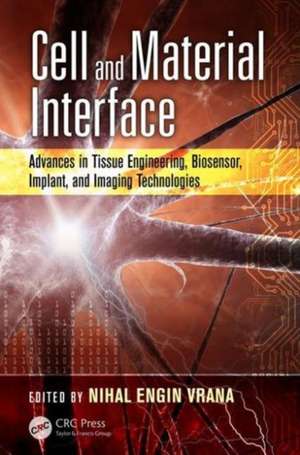Cell and Material Interface: Advances in Tissue Engineering, Biosensor, Implant, and Imaging Technologies: Devices, Circuits, and Systems
Editat de Nihal Engin Vranaen Limba Engleză Hardback – 18 noi 2015
Featuring contributions from leading molecular biologists, chemists, and material scientists, this authoritative reference:
- Presents practical examples of cell and material interface-based applications
- Reflects the interdisciplinary nature of bioengineering, covering topics such as biosensing, immunology, and controlled delivery
- Explains the role of the cell and material interface in the context of cardiac and skin tissue engineering, nanoparticles, natural polymers, and more
Din seria Devices, Circuits, and Systems
- 8%
 Preț: 390.20 lei
Preț: 390.20 lei - 8%
 Preț: 542.61 lei
Preț: 542.61 lei - 8%
 Preț: 404.83 lei
Preț: 404.83 lei - 29%
 Preț: 1019.63 lei
Preț: 1019.63 lei - 30%
 Preț: 889.43 lei
Preț: 889.43 lei - 20%
 Preț: 1165.92 lei
Preț: 1165.92 lei - 26%
 Preț: 456.63 lei
Preț: 456.63 lei - 30%
 Preț: 878.42 lei
Preț: 878.42 lei - 18%
 Preț: 1552.73 lei
Preț: 1552.73 lei - 28%
 Preț: 1307.37 lei
Preț: 1307.37 lei - 30%
 Preț: 850.59 lei
Preț: 850.59 lei - 18%
 Preț: 751.07 lei
Preț: 751.07 lei - 29%
 Preț: 1097.55 lei
Preț: 1097.55 lei - 27%
 Preț: 427.84 lei
Preț: 427.84 lei - 27%
 Preț: 429.30 lei
Preț: 429.30 lei - 18%
 Preț: 1118.65 lei
Preț: 1118.65 lei - 26%
 Preț: 1406.48 lei
Preț: 1406.48 lei - 31%
 Preț: 681.15 lei
Preț: 681.15 lei - 30%
 Preț: 851.82 lei
Preț: 851.82 lei - 18%
 Preț: 1391.72 lei
Preț: 1391.72 lei - 26%
 Preț: 456.63 lei
Preț: 456.63 lei - 27%
 Preț: 456.63 lei
Preț: 456.63 lei - 34%
 Preț: 391.84 lei
Preț: 391.84 lei - 29%
 Preț: 1107.18 lei
Preț: 1107.18 lei - 25%
 Preț: 524.78 lei
Preț: 524.78 lei - 30%
 Preț: 769.51 lei
Preț: 769.51 lei - 31%
 Preț: 408.36 lei
Preț: 408.36 lei - 30%
 Preț: 848.98 lei
Preț: 848.98 lei - 18%
 Preț: 846.43 lei
Preț: 846.43 lei - 22%
 Preț: 415.43 lei
Preț: 415.43 lei - 30%
 Preț: 857.50 lei
Preț: 857.50 lei - 35%
 Preț: 1088.40 lei
Preț: 1088.40 lei - 31%
 Preț: 838.82 lei
Preț: 838.82 lei - 30%
 Preț: 828.89 lei
Preț: 828.89 lei - 25%
 Preț: 884.86 lei
Preț: 884.86 lei - 35%
 Preț: 489.62 lei
Preț: 489.62 lei - 23%
 Preț: 456.63 lei
Preț: 456.63 lei - 26%
 Preț: 821.13 lei
Preț: 821.13 lei - 25%
 Preț: 496.94 lei
Preț: 496.94 lei - 28%
 Preț: 881.69 lei
Preț: 881.69 lei - 29%
 Preț: 1100.66 lei
Preț: 1100.66 lei
Preț: 754.68 lei
Preț vechi: 991.18 lei
-24% Nou
Puncte Express: 1132
Preț estimativ în valută:
144.41€ • 157.35$ • 121.68£
144.41€ • 157.35$ • 121.68£
Comandă specială
Livrare economică 03-17 aprilie
Doresc să fiu notificat când acest titlu va fi disponibil:
Se trimite...
Preluare comenzi: 021 569.72.76
Specificații
ISBN-13: 9781482256123
ISBN-10: 1482256126
Pagini: 294
Ilustrații: 57 black & white illustrations, 15 colour illustrations, 3 black & white tables, 1 colour tables
Dimensiuni: 156 x 234 x 23 mm
Greutate: 0.59 kg
Ediția:1
Editura: CRC Press
Colecția CRC Press
Seria Devices, Circuits, and Systems
ISBN-10: 1482256126
Pagini: 294
Ilustrații: 57 black & white illustrations, 15 colour illustrations, 3 black & white tables, 1 colour tables
Dimensiuni: 156 x 234 x 23 mm
Greutate: 0.59 kg
Ediția:1
Editura: CRC Press
Colecția CRC Press
Seria Devices, Circuits, and Systems
Cuprins
Editorial: Introduction to Cell/Material Interface. Scaffold Processing Technologies for Tailored Cell Interactions. Nanomaterial Cell Interactions in Tissue Engineering. Engineering Cell Surface Interface in Tissue Engineering and Cell-Based Biosensors. Protein Micropatterning Techniques for Tissue Engineering and Stem Cell Research. Cell–Scaffold Interfaces in Skin Tissue Engineering. Cell and Materials Interface in Cryobiology and Cryoprotection. Micropatterning Techniques to Control Cell–Biomaterial Interface for Cardiac Tissue Engineering. Polysaccharide-Based Biomaterials for Cell–Material Interface. Macrophage-Mediated Foreign Body Responses.
Notă biografică
Nihal Engin Vrana is the director of fundamental research at Protip Medical. He earned his Ph.D from Dublin City University as a Marie Curie early-stage researcher fellow. Dr. Vrana is the scientific coordinator of two European projects, EuroTransBio Bimot and FP7 IMMODGEL. He has authored 32 articles in peer-reviewed academic journals, four book chapters, and two European patents. His awards include the Parlar Foundation Thesis of the Year (2006) award, European Society for Biomaterials Translational Research award (2011), 2nd Aegean R&D Patent competition 1st place award (2012), and Intelligent Fiber Optic Systems Outstanding Paper award (2013).
Recenzii
"The book is written in a clear manner by scientists working in the field. The pages are beautifully illustrated and each chapter concludes with plenty of references. I would recommend this book to anyone working in nanotechnology, advanced optics issues, and especially to people working in life sciences."
—Optics & Photonics News, March 2016
—Optics & Photonics News, March 2016
Descriere
This book addresses concepts essential to biomaterial production methods and cell and material interactions. Featuring contributions from molecular biologists, chemists, and material scientists, the text reflects the interdisciplinary nature of bioengineering, covering topics such as biosensing, immunology, and controlled delivery. It explores the cell and material interface and its engineering at length scales ranging from the nano to the macro, providing practical examples. The book explains the role of the cell and material interface in the context of tissue engineering, nanoparticles, natural polymers, and more.
